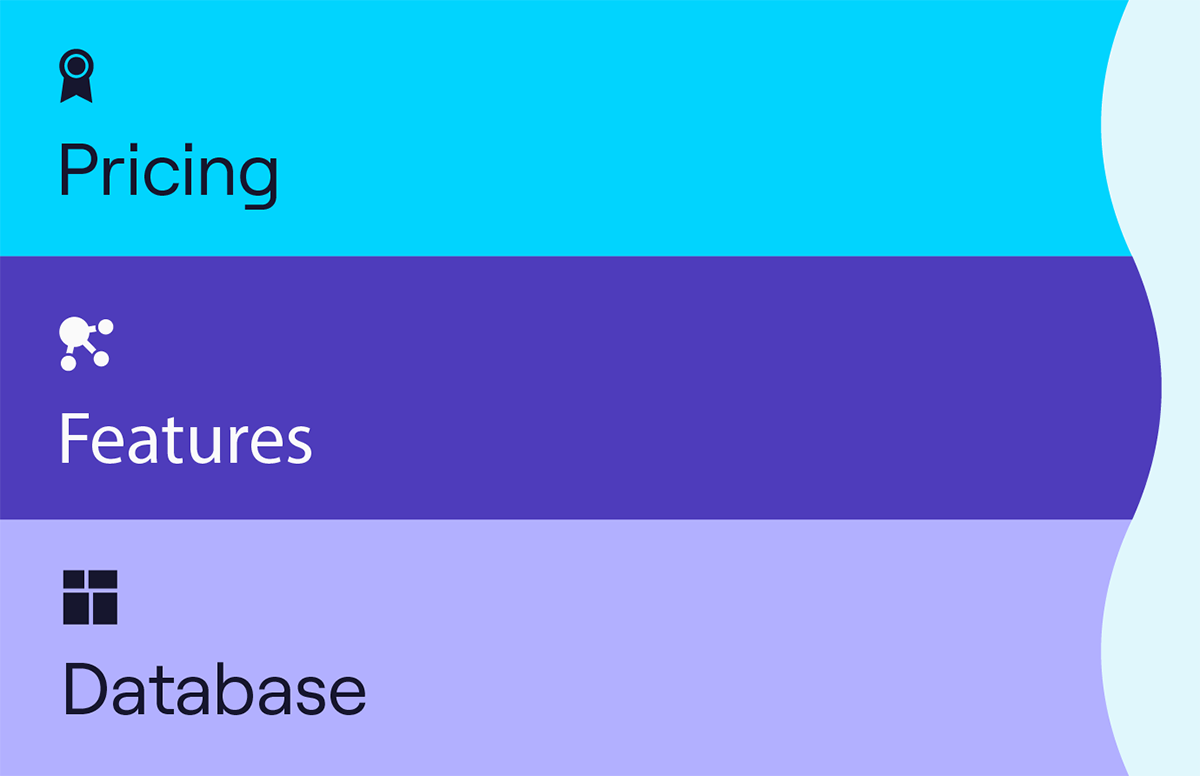14 Best Clay Alternatives for B2B Data Enrichment (2026)
The best Clay alternatives:
Get a data sample tailored to your ICP. 👇
I tested Clay alongside a dozen other lead generation, enrichment, and sales automation tools.
While Clay impressed me with its flexibility, I quickly learned it was built more for RevOps engineers than revenue teams. Managing API chains, juggling credits, and fixing inconsistent data quality took more time than it saved.
So I decided to explore Clay alternatives that promised to deliver accurate, compliant, and sales-ready data without the technical overhead.
Here’s what I found.
TL;DR
| Tool | Best for | Key differentiator |
| Cognism | Revenue teams that need verified, compliant contact data. | Governed AI with verified mobiles and GDPR-first compliance. |
| ZoomInfo | Large enterprises focused on US markets. | Large US database with technographic insights. |
| Datanyze | Quick technographic checks. | Easy Chrome extension for identifying company tech stacks. |
| Seamless.AI | SDRs who prospect directly from LinkedIn. | Automated contact finding. |
| Lead411 | Teams wanting trigger-based prospecting. | Combines contact data with funding and hiring alerts. |
| Instantly | Outbound marketers managing cold-email campaigns. | AI email warm-up and deliverability tools. |
| FullContact | Marketers needing customer identity resolution. | Strong API for matching and enriching first-party data. |
| Adapt.io | SMBs looking for simple LinkedIn enrichment. | Straightforward Chrome extension and CRM sync. |
| Reply.io | Sales reps automating multichannel outreach. | Sequencing across email, LinkedIn and phone. |
| Hunter.io | Quick email lookups. | Email verification and domain search. |
| Breeze Intelligence | Marketers seeking firmographic enrichment. | Real-time form and ad enrichment for B2B marketers. |
| Lusha | Budget-conscious SMB sales teams. | Affordable Chrome extension. |
| Apollo.io | All-in-one outreach and enrichment platform. | Combines CRM, sequencing and prospecting in one tool. |
| Snov.io | Small teams building email campaigns. | Affordable mix of verification and drip automation |
When choosing these Clay alternatives, I focused on what really matters to modern go-to-market teams:
- GDPR and CCPA compliance: for outreach that stays risk-free and privacy-safe.
- Data accuracy: because bad data wastes time and erodes trust.
- Integration with tools like Salesforce, Outreach and HubSpot for smoother workflows.
- Transparent pricing: we all dislike discovering surprise credit charges or upgrade locks.
For me, these features are non-negotiables, especially for scaling teams entering new markets that need data they can trust.
Spoiler: I found Cognism to be the best alternative to Clay because it combines verified data with governed AI. So every lead is accurate, compliant, and sales-ready from the start.
But let’s take a deeper look at each, and I’m sure you’ll come to the same conclusion.
1. Cognism
👤 Ideal for larger teams aiming to boost customer revenue growth throughout Europe.
/Cognism%20Product%20-%20Compressed/Cognism-alternative-competitor-listicle-webp-1.webp?width=860&height=714&name=Cognism-alternative-competitor-listicle-webp-1.webp)
Cognism is a Clay alternative designed for sales teams who want results, not just workflows.
While Clay gives you flexibility, it also requires a lot of setup. Cognism skips that entirely. Its AI-governed system finds and verifies the right contacts automatically, so reps can spend more time in conversations rather than spreadsheets.
I was especially impressed by the sales intelligence and AI Search. Together, they make prospecting feel effortless.
You can find decision-makers through natural-language or voice search, get instant company insights, and act on phone-verified, compliant data that updates in real-time.
It’s everything Clay promises, but delivered out of the box and built for revenue teams, not engineers.
Features I enjoyed:
- Verified data: exclusive phone-verified mobiles that actually connect.
- Quality GDPR and CCPA-compliant data with DNC scrubbing in 15 countries - including Italy!
- Sales intelligence uses features like AI Search and Smart Personas to transform data into context. Plus, a built-in one-click LLM gives instant company insights without prompt writing. It’s like having a nifty sales assistant right by your side!
- International coverage: EMEA, NAM, APAC.
- Easy platform setup: the platform is easy to use and integrates with the tools I need. It also looks great, which is a bonus.
Pricing:
- Two packages to choose from: Grow and Elevate (Elevate includes Signals).
- All packages include contact and company data, including our phone-verified contacts, target market analytics and integrations to leading CRM and engagement tools.
- No extra charge for access to global and regional data — NAM, EMEA, and APAC are included in all packages.
- Verification on demand and intent data powered by Bombora as add-ons.
Want a quote? Click the button below, or explore Cognism’s pricing page.
Who is better: Cognism vs Clay
After using both, I found Clay’s waterfall enrichment approach clever in theory but risky in practice. Each enrichment relies on third-party vendors, meaning compliance is only as strong as the weakest link in the chain. I could never be entirely sure where the data came from or how recently it was verified.
With Cognism, I know exactly what I’m getting: verified, compliant, and ready to use. There’s no mystery source, no grey area. What you see really is what you get.
Another major difference is transparency and capability.
Clay has intent data, but no on-demand verification service, and its credit-based pricing can quickly add hidden costs from failed API calls, for example.
Cognism, on the other hand, includes everything in one predictable package: verified mobiles and emails, intent data, and human-checked on-demand verification.
You also get unrestricted access to international data, profile views, and page-level exporting.* It’s the difference between building a toolchain yourself and logging in to one that’s already optimised for performance and compliance.
For a more detailed comparison, see Cognism’s Clay vs Cognism page.
And, I’m not the only user who thinks this:

Managing Director @Mollie

Want to give Cognism a try?
Chat to a salesperson who’ll set up 25 free leads tailored to your target market.
2. ZoomInfo
👤 Best for Enterprise businesses looking for US data with deeper insights.
/Competitors%20and%20other%20tools/ZoomInfo-Competitor-Alternative.webp?width=630&height=394&name=ZoomInfo-Competitor-Alternative.webp)
Another good alternative to Clay is ZoomInfo. It provides various business intelligence tools for sales, marketing, recruitment, and operations, and the company and contact search offers detailed insights into company profiles.
I didn’t like that some functionalities are only available with higher-tier plans, and accessing global data incurred additional costs.
Features I enjoyed:
- Depth of company data and technographics.
- Integration with major CRMs and marketing automation tools.
Pricing:
ZoomInfo pricing must be requested from the website and follows individual pricing tiers for sales, marketing, and recruitment. Seats, credits, and supplementary tools also affect cost.
Who is better: Clay vs ZoomInfo
ZoomInfo is known for its large US dataset, and many teams find it excellent for domestic coverage. However, the Global Data Passport (Global, Europe, North America Plus) at an extra cost aren’t ideal.
Clay gives you flexibility with API-driven enrichment, but that can mean more setup and a reliance on third-party sources. For me, Cognism combines the best of both worlds: quality European data without an extra charge and the ease of use that Clay lacks.
Cognism offers unrestricted access to data and page-level exporting, minimising the necessity to buy additional credits. This is advantageous for users who rely heavily on cold calling. Furthermore, all their packages include essential features, such as DNC list checking for 15 countries.
Read this overview for a comprehensive comparison of Cognism and ZoomInfo.
After all, users agree that Cognism wins when it comes to data accuracy:

Head of Revenue Operations @Bright Network

3. Datanyze
👤 Ideal for quick technographic checks.
/Competitors%20and%20other%20tools/Datanyze-listicle-competitor-alternative.webp?width=572&height=550&name=Datanyze-listicle-competitor-alternative.webp)
Datanyze is a Clay alternative that helps you find information on a prospect when searching LinkedIn. You can get their basic information, email address, and phone number.
I thought Datanyze was nice for quick tech insights, though its contact data may feel limited for full-scale B2B prospecting.
Features I enjoyed:
- Chrome extension is easy to use.
- Good for identifying tools prospects already use.
Pricing:
The free plan offers only ten credits monthly. Paid plans start at $29 per month and are strictly limited by credits.
Who is better: Clay vs Datanyze
Datanyze focuses on technographic data, while Clay is all about workflow flexibility. I liked Datanyze for its Chrome extension and quick insights into what tools companies use, but it stops there. It doesn’t go deep into contact accuracy or compliance.
Clay can automate enrichment from multiple vendors, but you may still face the same data consistency issues. Cognism, by contrast, gives you both verified, compliant data and the context to act on it.
4. Seamless.AI
👤 Ideal for AI-powered contact discovery in the US.
/Competitors%20and%20other%20tools/Seamless.AI-listicle-competitor-alternative.webp?width=540&height=449&name=Seamless.AI-listicle-competitor-alternative.webp)
Seamless.AI uses AI to scour the web for lead-generation information. As a competitor to Clay, Seamless.AI offers free credits for users interested in trying out the platform before committing. Additionally, the company gathers data submitted by customers to enhance its database.
I thought it was decent if you’re building lists fast, but I’d always verify before launching a campaign because the accuracy may be hit or miss.
Features I enjoyed:
- Chrome extension for LinkedIn prospecting.
- Built-in email sequencing.
Pricing:
Seamless.AI pricing packages include Free, Pro, and Enterprise. The pricing is based on credits and the required number of user seats.
Who is better: Clay vs Seamless.AI
Seamless.AI is easier to use than Clay, but some users have reported data quality issues. That said, Seamless.AI is ideal for teams prioritising automation over data comprehensiveness.
But here’s the thing:
Cognism might suit your business needs better.
Here’s why:
Cognism has an extensive senior-level contact database in the European market, with the added benefit of phone-verified mobiles and an AI-search feature that speeds up prospecting by 74%.
Seamless doesn’t offer phone-verified mobiles, and its data is geared toward the US, claiming the tool is unsuitable for use outside of the US.
Learn more about Cognism vs Seamless.AI.
Here’s what customers say:

Head of Marketing @Plandek

5. Lead411
👤 Ideal for small to medium-sized businesses looking for cost-effective B2B contact information in the US.
/Competitors%20and%20other%20tools/Lead411-Alternative-Listicle-Competitor.webp?width=942&height=500&name=Lead411-Alternative-Listicle-Competitor.webp)
The next Clay competitor is Lead411, a B2B data platform that provides verified contact and account information for lead generation.
I found that mobiles in North America are pretty good. However, this tool may become expensive compared to Lusha because credits are needed for plans other than its custom Unlimited package.
Features I enjoyed:
- Event-based triggers.
- Multi-channel campaigns.
Pricing:
Lead411 offers monthly and annual plans. Depending on the duration, you can choose between Basic, Pro, and Unlimited. Up-to-date pricing is available on its website.
Who is better: Clay vs Lead411
Lead411 impressed me with its event-based triggers, something Clay doesn’t offer natively. But while Clay can automate enrichment from multiple APIs, it’s only as compliant as those vendors are.
Lead411 is also more affordable than Clay; however, its coverage is better for US prospecting, and its compliance standards are less strict than Cognism’s. For teams that need accurate, legally compliant, and scalable data, Cognism remains a great choice.
Learn more about Cognism vs Lead411.
6. Instantly
👤 Ideal for outbound marketers managing cold-email campaigns.
/Competitors%20and%20other%20tools/instantly-ai.webp?width=2164&height=1620&name=instantly-ai.webp)
Clay alternative, Instantly is an AI lead finder with AI workflows and automated outreach functionality. The platform self-verifies its leads, so you only pay for verified B2B leads.
Instantly works well for cold email automation, though it’s not built for data sourcing or compliance.
Features I enjoyed:
-
AI-driven email warm-up.
-
Intuitive campaign builder.
Pricing:
Instantly has three pricing plans (and a fourth custom option for enterprise companies), each with monthly contact upload and email outreach limits.
Who is better: Clay vs Instantly
Instantly and Clay are entirely different tools. Clay helps you build workflows; Instantly helps you send cold emails.
I like Instantly’s AI warm-up feature, but it doesn’t solve the problem of data quality or compliance.
7. FullContact
👤 Ideal for marketers needing customer identity resolution.
/Competitors%20and%20other%20tools/FullContact-Listicle-Competitor-Alternative.webp?width=1400&height=1302&name=FullContact-Listicle-Competitor-Alternative.webp)
FullContact is a comprehensive customer intelligence platform specialising in contact management and enrichment. The platform uses advanced data-matching algorithms to merge and update contact records.
It’s a strong tool for identity matching, but like Clay, it requires more technical setup than I’d like.
Features I enjoyed:
-
Strong API for matching customer data.
-
Good for marketing personalisation.
Pricing:
You’ll need to book a sales call to get a quote or to see the packages FullContact offers.
Who is better: Clay vs FullContact
FullContact is an identity-resolution platform that’s great for enriching existing first-party data.
Clay allows you to combine multiple enrichment sources, which can make compliance complex to track. I prefer Cognism’s governed AI approach. It keeps contact enrichment simple, transparent, and fully compliant without needing a developer to manage it.
8. Adapt.io
👤 Ideal for SMBs looking for simple LinkedIn enrichment.
/Competitors%20and%20other%20tools/Adapt-listicle-competitor-alternative.webp?width=1234&height=604&name=Adapt-listicle-competitor-alternative.webp)
Adapt.io is a data provider and a Clay competitor that provides B2B data via easy-to-use software. Sales and marketing professionals use it to generate leads, tailor interactions, and execute go-to-market strategies.
It’s a decent starter option, but not one I’d rely on at scale or for high-touch prospecting. I also found it lacked advanced filters and enrichment depth.
Features I enjoyed:
- Easy to use.
- Integrates with CRMs.
- Chrome extension.
Pricing:
You’ll need to fill in a form to request pricing information from Adapt.
Who is better: Clay vs Adapt.io
Adapt.io and Clay both make enrichment accessible, but Adapt is simpler to use and better suited for quick contact lookups. Clay’s value lies in automation, though the technical setup may be heavy for non-engineers.
9. Reply.io
👤 Ideal for sales reps automating multichannel outreach.
/Competitors%20and%20other%20tools/Still%20to%20approve/Reply.io/reply-io-product-graphic.webp?width=1366&height=800&name=reply-io-product-graphic.webp)
Reply.io is a multichannel sales engagement platform and Clay alternative. LinkedIn is just one of the channels it supports, alongside SMS, WhatsApp, email, and call scheduling.
Features I enjoyed:
-
Multichannel automation (email, LinkedIn, calls).
-
Native AI assistant for message drafts.
Pricing:
Reply.io offers three different plans, each with different features to suit varying needs: the Email Volume plan, the Multichannel plan and the AI SDR option.
Who is better: Clay vs Reply.io
Reply.io focuses on outreach, not enrichment. Clay helps you build enrichment chains but doesn’t offer sequencing or campaign tools like Reply does.
10. Hunter.io
👤 Ideal for quick email lookups.
/Competitors%20and%20other%20tools/hunterio-competitor-listicle-alternative-webp.webp?width=681&height=424&name=hunterio-competitor-listicle-alternative-webp.webp)
Hunter.io is an email and domain finder that lists publicly available email addresses and automates email campaigns. It doesn’t offer direct dials or intent data.
Although contact data isn’t Hunter’s primary focus, it is a good alternative to Clay for automating email outreach.
Features I enjoyed:
-
Domain search for bulk email discovery.
-
Clear deliverability scoring.
Pricing:
Choose from Free, Starter, Growth and Business plans. Subscriptions include unlimited team members who share common quotas.
You’ll find up-to-date pricing information on Hunter.io’s website.
Who is better: Clay vs Hunter.io
Hunter.io is great for simple email lookups; Clay can automate that same workflow using multiple vendors, but it doesn’t have a verification service.
11. Breeze Intelligence (Clearbit)
👤 Ideal for marketers seeking firmographic enrichment.
/Competitors%20and%20other%20tools/Breeze-Intelligence-Competitor-Alternative-Clearbit.webp?width=422&height=531&name=Breeze-Intelligence-Competitor-Alternative-Clearbit.webp)
Breeze Intelligence, now Clearbit, is a Clay competitor in the marketing intelligence sector. It’s particularly well-suited for marketing and operations teams aiming to enhance their existing data and automate workflows.
The new tool, created by HubSpot, employs AI and your CRM data to research companies, prepare for sales calls, build pipelines, and summarise CRM records, streamlining marketing and sales efforts.
You’ll need a HubSpot account to add Breeze Intelligence to your plan.
Features I enjoyed:
- Real-time form enrichment.
- Marketing-friendly firmographics.
Pricing:
Breeze Intelligence pricing is based on 100, 1,000 and 10,000 credit packs.
Who is better: Clay vs Clearbit
Breeze (the new Clearbit) and Clay both focus on enrichment, but Breeze is geared toward marketing use cases like form fills and ad targeting. Clay lets you connect multiple data APIs, which offers flexibility but also adds complexity around quality control and compliance.
Cognism keeps it simple with verified, compliant data that works for marketing and sales. And if you still want that API flexibility, you can have it too.
With Cognism’s Data-as-a-Service (DaaS) offering, teams can securely integrate Cognism’s verified dataset into their systems without compromising accuracy, compliance, or control.
Learn more about Cognism vs Clearbit/Breeze Intelligence.
12. Lusha
👤 Ideal for budget-conscious SMB sales teams.
/Competitors%20and%20other%20tools/lusha-web-app-product-graphic-alternative.webp?width=1380&height=816&name=lusha-web-app-product-graphic-alternative.webp)
Like many of Clay’s competitors, Lusha is generally considered a cheaper, easier-to-use alternative.
With the cost shown upfront, Lusha’s monthly subscription plans can suit SMBs and startups better than Clay’s upmarket pricing model.
However, Lusha hides many of its advanced features in its custom plan, which has to be negotiated with its sales team.
Features I enjoyed:
-
Quick setup.
-
Chrome extension for LinkedIn.
Pricing:
Packages include Free, Pro, Premium, and Scale. Pricing is based on credits per user. The Lusha website provides precise pricing information.
Who is better: Clay vs Lusha
Clay’s appeal lies in its flexibility, while Lusha’s is in its simplicity. Lusha is quick to install and use, while Clay requires more setup.
13. Apollo.io
👤 Ideal for start-ups and small to medium-sized enterprises looking for automation features.
/Competitors%20and%20other%20tools/Apollo-alternative-competitor.webp?width=550&height=550&name=Apollo-alternative-competitor.webp)
Next on my list of Clay alternatives is Apollo.io. It’s lead-generation software that facilitates effective prospecting.
It’s nice to have prospecting and engagement in one place. But I’d always double-check contact validity before deploying at scale, especially in US SMB data.
Features I enjoyed:
-
Sequence automation.
- Sales call transcriber, analyser, and insight extractor.
Pricing:
Apollo.io charges per user per month, and you need credits to access data. You can choose between Free, Basic, Professional, and Organization packages.
You’ll find accurate Apollo.io pricing information on the website.
Who is better: Clay vs Apollo.io
Apollo.io combines enrichment and outreach under one roof, but it uses a credit-based model that can limit usage. Clay’s automation is flexible, yet still relies on third-party sources for data accuracy.
Some users question Apollo’s data accuracy in certain regions.
Cognism offers excellent data accuracy with its exclusive verified dataset and DNC list screening in 15 countries, making it a fantastic option for regulated industries and global teams.
According to the latest Forrester Wave report, Cognism outperformed Apollo regarding contact data quality, security, and compliance.
Check out a comprehensive comparison between Apollo.io and Cognism.
Here’s what one user had to say:

Director of Business Development @SUB1

14. Snov.io
👤 Ideal for small teams building email campaigns.
/Competitors%20and%20other%20tools/Snov.io-competitor-alternative-listicle.webp?width=499&height=421&name=Snov.io-competitor-alternative-listicle.webp)
My last Clay competitor is Snov.io, a sales toolbox and CRM platform. Users can build email lists, accelerate LinkedIn outreach, and manage leads with a unified inbox.
Snov.io is a good entry-level option, but the data accuracy wasn’t consistent across all regions.
Features I enjoyed:
-
Chrome extension for finding emails.
-
Easy drip campaign builder.
Pricing:
Packages include Trail, Starter and Pro. You can find accurate Snov.io pricing directly on the website.
Who is better: Clay vs Snov.io
Snov.io is an affordable option for small teams that need basic email finding and automation.
Clay can integrate with tools like Snov.io for enrichment, but setting it up requires time and API know-how.
Cognism provides a ready-to-use solution with verified data, intent, and compliant enrichment; no integrations or credit systems required.
Why I chose Cognism as the best Clay alternative
After testing everything on this list, Cognism was the only platform that gave me sales-ready outcomes without engineering overhead.
Where Clay depends on waterfall enrichment and third-party APIs (with the compliance risk that comes with them), Cognism’s governed AI and phone-verified data mean I know exactly what I’m getting: accurate, GDPR/CCPA-aware contacts that connect, with DNC screening across 15 countries and Signals to prioritise intent.
It also ticks the operational boxes Clay doesn’t.
Cognism's sales intelligence and AI Search cut research time to minutes; on-demand verification removes doubt before outreach; and pricing is predictable: no surprise credit burn from failed calls.
Need API flexibility? You still have it via Cognism’s Data-as-a-Service, but with the assurance that the underlying data stays consistent and compliant.
Add unrestricted global coverage and excellent integrations (Salesforce, HubSpot, Outreach), and Cognism becomes the simpler, compliant path to pipeline.
What you see is what you get, and what you get is reliable, scalable growth.
/CTAs%20(SEO)/high-intent-cta-basic-data-sample-webp.webp?width=1376&height=528&name=high-intent-cta-basic-data-sample-webp.webp)

/Source%20of%20truth%20vs%20system%20of%20record/source-of-truth-vs-system-of-record-card.webp)
